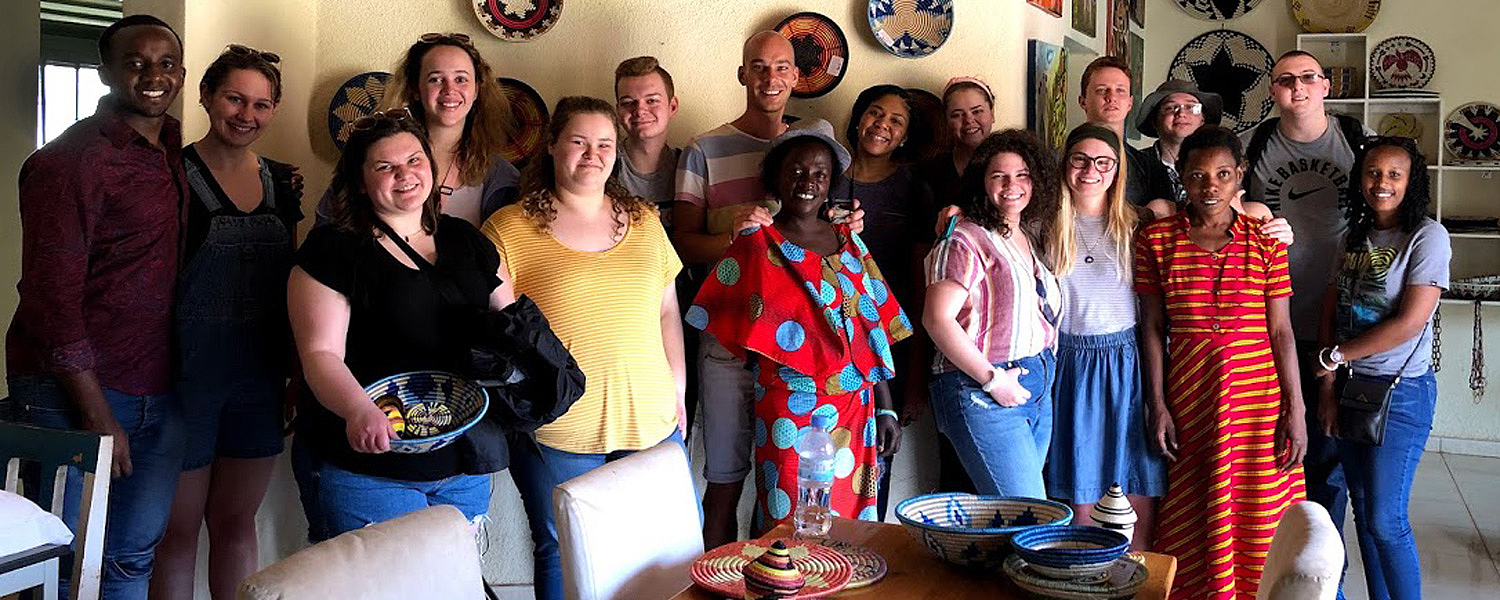║┌┴Ž│į╣Ž═° Stark students discuss their trip to Rwanda with the community at Global Gateway Day.
Stained red from the earthy ground, their palms were open wide to meet the day. 
Painted with a shared collective experience, their homeland distance of 7,489 miles, barriers of language and culture faded away in the moment.
There was only this.
The house that they helped build.
From one hand to the other, the students worked together to pass mounds of red mud and clay that would become the home of a woman widowed during the Rwandan genocide. Brick by brick, the hut was pieced together in part by the ║┌┴Ž│į╣Ž═° at Stark students, who made the trek and made the difference. They worked alongside local community members, police and military to take part in the monthly service project, known as ŌĆ£Umuganda.ŌĆØ
For the 13 who crossed the Atlantic, they left home to find themselves. Now, the students speak out with one voice, sharing their experiences with friends and family, the campus and the community at events, such as the recent Global Gateway Day.
ŌĆśRWANDA TO THE WORLDŌĆÖ
Professor Leslie HeaphyŌĆÖs class on the history of genocide provided structure for the weeklong trip over spring break.
ŌĆ£As a historian, I was drawn to the events of 25 years ago but, more importantly in many ways is what Rwanda has done since then, the reconciliation and the recovery,ŌĆØ she said. ŌĆ£There is so much the world could learn from Rwanda if we would just open up.ŌĆØ
For Isabelle Cullen, the short-term study abroad trip marked her first time traveling outside of the country. 
ŌĆ£This is unprecedented territory for not only me, but for ║┌┴Ž│į╣Ž═°, which hasnŌĆÖt really seen a trip like this,ŌĆØ said Cullen, a freshman nursing student. ŌĆ£I mean, itŌĆÖs all the way to Africa.ŌĆØ
And, that, is exactly the point.
Just ask Pacifique Niyonzima, who was orphaned at the age of 3 in 1994, when between 800,000 and 1 million Tutsi Rwandans were killed by their Hutu neighbors. Nearly 70 percent of the Tutsi population was murdered in the genocide.
After the massacre, the country Niyonzima was born into was gone. ŌĆ£Families were torn apart. There was no education, no economy. Nothing,ŌĆØ he said. ŌĆ£The government truly had to rebuild the country from scratch. I still donŌĆÖt understand why that happenedŌĆ” why the world let that happen.ŌĆØ
Niyonzima, now a graduate student at ║┌┴Ž│į╣Ž═° studying higher education administration, dreamed of making the journey to his home country a reality.
ŌĆ£The solution is education and that is why we are doing this. IŌĆÖve always believed that I could use my education to make a difference,ŌĆØ he said. ŌĆ£I believe an education is not just about investing in myself, it is about investing in other people. ThatŌĆÖs why I have sought to do this trip.
ŌĆ£When we learn from each other, we are truly changed. For me, itŌĆÖs about bringing the world to Rwanda and Rwanda to the world.ŌĆØ
FEAR NO MORE
The trip seemed like a longshot until Niyonzima connected with two members of the Stark Campus ŌĆō Heaphy and Sarah Schmidt, assistant director of Global Education.
Heaphy designed her course around the trip. Niyonzima arranged class activities in Rwanda, lodging and transportation. The students also traveled to Washington, D.C., upon arrival home to participate in a ceremony recognizing the 25th anniversary of the genocide.
ŌĆ£The timing of this trip was perfect,ŌĆØ Schmidt said. ŌĆ£For me, this is what global education is all about ŌĆō a beautiful, cross-cultural engagement founded upon empathizing with other people, humanizing each other and finding those shared commonalities. These 13 students were immersed into a completely foreign environment but walked away with a fuller understanding of what it means to be human.ŌĆØ 
While their eyes were opened to the horrors of history, the students also witnessed firsthand the loving unity and sense of community that is present-day Rwanda.
ŌĆ£We were welcomed with open arms, and honestly, at first we werenŌĆÖt sure what to expect,ŌĆØ acknowledged Landon Ellis, a sophomore studying criminal justice. ŌĆ£When I told my friends and family about the trip, they said, ŌĆśYou know thatŌĆÖs Africa, right? ThatŌĆÖs a very dangerous place.ŌĆÖ
ŌĆ£We overcame stereotypes and fear and have arrived home to educate our families, friends and the community about the kindness of a nation.ŌĆØ
Recent graduate Marissa Hoover said the United States could learn a lot from Rwanda.
ŌĆ£You go to Rwanda, a region that has been completely torn apart, and yet they all can agree on one thing: they are all Rwandan, they are all human and, at the base level, they can figure out their issues and build again,ŌĆØ she said.
All students agreed the trip was a once-in-a-lifetime opportunity; an experience marked by shared goals of peace.
First greeted with the Rwandan word that means ŌĆ£outsider,ŌĆØ by the end of the trip the students were a part of the inner circle, standing hand in hand. Now, they were called ŌĆ£friend.ŌĆØ
ŌĆ£What brings me hope is to see how the people of Rwanda have come together,ŌĆØ Niyonzima said. ŌĆ£How we can all come together as one people, one humanity and one united world.ŌĆØ
